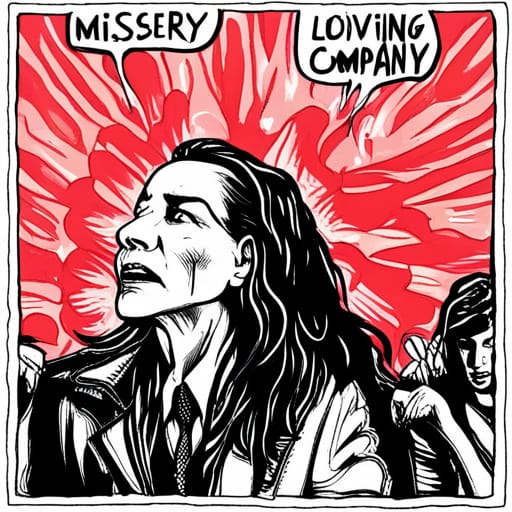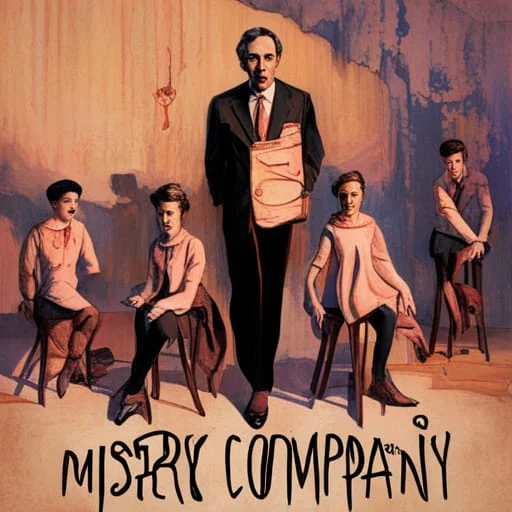We’ve all heard the phrase “misery loves company,” but have you ever wondered about its deeper meaning? Beyond its surface interpretation, this intriguing saying holds valuable insights into human behavior and the dynamics of emotional connection. In this blog post, we will embark on a journey to unravel the true essence of “misery loves company” and explore the profound implications it has on our lives.

Introduction
When misery loves company, one person’s discomfort becomes much more tolerable and enjoyable because there’s somebody else to suffer alongside them. The misery can manifest many different things, such as loneliness, isolation, or low self-esteem.
While the phrase is often used to describe someone who is deliberately trying to make others feel as bad as they do, some simply enjoy commiserating with others. After all, it can be nice to know that you’re not alone. And sometimes, it’s just easier to talk to someone who understands what you’re going through.
A man who does not think for himself does not think at all.
Oscar Wilde
Misery Loves Company Meaning
At its core, “misery loves company” refers to the tendency of individuals who are unhappy or in a state of misery to seek solace in the shared suffering of others. It suggests that people find comfort and understanding in the presence of those who can relate to their pain. While this saying may seem pessimistic, it unveils a fundamental truth about human nature: our deep-seated need for emotional connection and understanding.
History
The phrase “misery loves company” is thought to have originated in the late 1600s. It was first recorded in print in 1692 in a book called The Compleatapache by English author Thomas Brown. In the book, a character named Misfortune says the following: “Misery loves company; but company loves not misery.”
The Greeks believed that having good friends is one of the essential things in life; they thought only a friend who had shared suffering could be considered trustworthy and reliable. So people used to seek sympathy from their friends—especially before battle—to gain support and courage.
Shared Experiences and Empathy
One reason why misery tends to seek company is the power of shared experiences. When we encounter challenging situations, we often yearn for someone who understands what we’re going through. There’s a certain relief in knowing that we’re not alone in our struggles. This shared empathy can foster a sense of unity and provide solace during difficult times.
The Negativity Bias
The concept of “misery loves company” also sheds light on our inherent negativity bias. As humans, we are wired to pay more attention to negative experiences than positive ones. This bias serves as a survival mechanism, allowing us to be more cautious and avoid potential threats. Consequently, negative emotions tend to have a stronger impact on us, making us more drawn to others who share similar feelings.
The Importance of Emotional Balance
While seeking solace in shared misery can provide temporary relief, it’s crucial to recognize the need for balance. Constantly dwelling in negativity and surrounding ourselves only with others who are unhappy can perpetuate a cycle of misery. It’s essential to find a healthy equilibrium between seeking support and working towards personal growth and positivity.

Breaking the Cycle
Breaking the cycle of “misery loves company” involves taking proactive steps to change your mindset, behaviors, and social interactions. Here are some strategies to help you break free from this cycle:
Practice self-awareness
Become mindful of your own emotional states and thought patterns. Recognize when you’re dwelling in negativity and consciously choose to shift your focus towards more positive aspects of life.
Cultivate empathy
Develop the ability to understand and share the feelings of others. Actively listen to people’s experiences, validate their emotions, and offer support when needed. By fostering empathy, you can contribute to a more compassionate and understanding world.
Seek diverse connections
While it’s natural to gravitate toward those who understand our struggles, it’s also important to seek out diverse connections. Surrounding ourselves with people who bring positivity and different perspectives can broaden our horizons and contribute to personal growth.
Practice gratitude
Cultivate a sense of gratitude for the positive aspects of your life. By shifting your focus towards appreciation, you can counterbalance the allure of misery and create a more optimistic mindset.
A Twist In The Story
A recent study found that people are more likely to be happy when surrounded by happy people. The study, published in Nature Human Behavior, examined data from over 3 million people in 164 countries. Researchers found that happiness is not only affected by personal experiences but also by the enjoyment of those around them.
Conclusion
“Misery loves company” holds a multifaceted meaning that goes beyond mere negativity. It reflects our innate need for emotional connection, empathy, and shared experiences. While seeking solace in shared misery is understandable, it’s essential to strike a balance and actively pursue personal growth, positivity, and diverse connections. By doing so, we can break free from the chains of misery and foster a more balanced and fulfilling life. Remember, the true emotional connection lies not only in shared pain but also in shared joy and growth.
People who are unable to motivate themselves must be content with mediocrity, no matter how impressive their other talents.
Frank Newport





